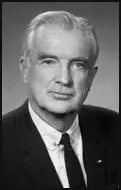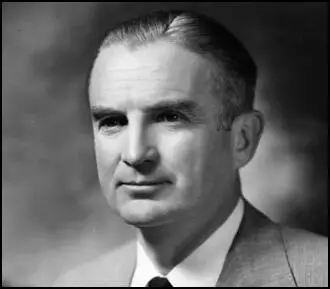Stuart Symington

William Stuart Symington was born in Amherst, Massachusetts on 26th June, 1901. Soon afterwards the family moved to Baltimore, Maryland. In 1918 he joined the U.S. Army and by they time he left he had reached the rank of second lieutenant.
After graduating from Yale University Symington he briefly became a newspaper reporter in Baltimore. Later he worked as an iron moulder in Rochester (1923-26). After studying mechanical and electrical engineering by correspondence course he became an executive with a steel company. In 1938 he moved to St. Louis to become president of the Emerson Electric Manufacturing Company.
As a member of the Democratic Party, in 1947, Harry S. Truman appointed Symington as his Assistant Secretary of War for Air. This was followed by holding the posts of Secretary of the Air Force (1947-1950), chairman of the National Security Resources Board (1950-51) and Reconstruction Finance Corporation Administrator (1951-52).
In 1952 Symington was elected to the Senate. He became a respected political figure and in 1960 attempted to win the party's presidential nomination. John F. Kennedy won the nomination and decided to make Symington his running-mate. When Clark Clifford brought him the news, Symington accepted the post but said: "I bet you a hundred dollars that no matter what he says, Jack will not make me his running mate. He will have to pick Lyndon".

In the background Philip Graham and Joseph Alsop were attempting to persuade John F. Kennedy to appoint Lyndon B. Johnson instead. Despite the objection of Robert Kennedy and other leading advisers, Kennedy decided to replace Symington with Johnson.
Symington served in the Senate until his resignation on 27th December, 1976. He lived in New Canaan, Connecticut until his death on 14th December, 1988.
Primary Sources
(1) Katharine Graham, Personal History (1997)
Phil and I flew to California early, five days before the Democratic Convention was to open on July 11. I was already committed to Kennedy. Phil remained loyal to Johnson until he lost the bid for the nomination, but he was entirely realistic, and he, too, admired JFK...
Phil called on Bobby Kennedy and got from him confidential figures on his brother's strength, numbers that showed JFK very close to the number of votes needed to win the nomination close enough so that the Pennsylvania delegation, or a big chunk of it, could put him over. On Monday, Pennsylvania caucused and announced that the state delegation would give sixty-four of its eighty-one votes to Kennedy, which made Phil and the Post reporters write that it would be Kennedy on the first ballot.
At that point, Phil got together with Joe Alsop to discuss the merits of Lyndon Johnson as Kennedy's running mate. Joe persuaded Phil to accompany him to urge Kennedy to offer the vice-presidency to Johnson. Joe had all the secret passwords, and the two men got through to Evelyn Lincoln, Kennedy's secretary, in a room next to his dreary double bedroom and living room. They took a seat on one of the beds and nervously talked out who would say what, while they observed what Joe termed "the antechambers of history." Joe decided he would introduce the subject and Phil should make the pitch.
When they were then taken to the living room to see JFK, Joe opened with, "We've come to talk to you about the vice-presidency. Something may happen to you, and Symington is far too shallow a puddle for the United States to dive into. Furthermore, what are you going to do about Lyndon Johnson? He's much too big a man to leave up in the Senate." Then Phil spoke "shrewdly and eloquently," according to Joe - pointing out all the obvious things that Johnson could add to the ticket and noting that not having Johnson on the ticket would certainly be trouble.
Kennedy immediately agreed, "so immediately as to leave me doubting the easy triumph," Phil noted in a memo afterwards. "So I restated the matter urging him not to count on Johnson's turning it down, but to offer the VPship so persuasively as to win Johnson over." Kennedy was decisive in saying that was his intention, pointing out that Johnson could help not only in the South but elsewhere in the country.
Phil told the Post's reporters they could write that "the word in L.A. is that Kennedy will offer the Vice-Presidency to Lyndon Johnson."
(2) Pierre Salinger, With Kennedy (1966)
Following the nomination and selection of Johnson as the vice-presidential candidate Thursday night, I returned to the office and was immediately called by a number of newspaper men who were checking on a story by John S. Knight, publisher of the Knight Newspapers, which purported that Johnson had forced Kennedy to select him as the vice-presidential candidate.
Earlier that day I had gone to Bob Kennedy's room which was across from mine in the Biltmore Hotel. Ken O'Donnell was there and after I came in they were discussing the possibilities for Vice President. Bob Kennedy asked me to compute the number of electoral votes in New England and in the "solid South." I asked him if he was seriously thinking of Johnson and he said he was. He said Senator Kennedy was going over to see Johnson at 10 a.m. Ken O'Donnell violently protested about Johnson's being on the ticket and I joined Ken in this argument. Both of us felt that Senator Stuart Symington would make a better candidate but Senator Johnson seemed to be on Bob's mind. I remembered all of this later that night when I saw the news report about Johnson forcing himself on the ticket.
I called Bob Kennedy that night to check the Knight story. Bob said it was absolutely untrue. From my conversation with him, however, I gathered that the selection of Johnson had not been accomplished in the manner that the papers had reported it had. I got the distinct feeling that, at best, Senator Kennedy had been surprised when he asked Senator Johnson to run for Vice-President and Johnson accepted...
A day or two after the convention, I asked JFK for the answer to that question. He gave me many of the facts of the foregoing memo, then suddenly stopped and said: "The whole story will never be known. And it's just as well that it won't be."


